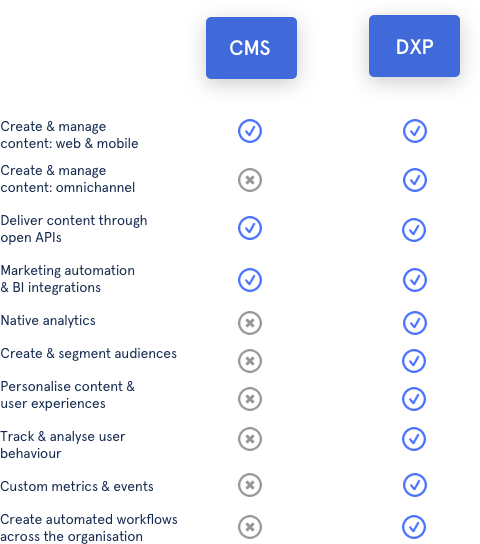Customer experience has been at the heart of many successful businesses for years; however, recent shifts in consumer behaviours and expectations brought about by COVID-19 are rapidly changing how companies connect with and serve customers.

Today, Digital Experience Platforms (DXPs) bring together learnings across the digital and technological world to deliver personalised experiences that drive business value using advancements in analytics, machine learning and access to content from a vast array of devices. They are also designed to centralise the digital experience and activity of those teams and businesses who utilize these platforms as effective “central nervous systems” to their digital strategies.
DXPs are an evolution of the traditional Content Management System (CMS) approach to organising content, data and other media for your digital window to the world. Gartner defines DXPs as “integrated and cohesive pieces of technology designed to enable the composition, management, delivery and optimization of contextualized digital experiences across multi-experience customer journeys.”
As is often the case when new technology enters well established practices, marketers are often left with more questions than answers.
Here are some examples of why a CMS alone is not compatible with today’s digital demanding landscape, where customers expect a consistent and personalised experience at every touchpoint along their journey:
- A CMS cannot automatically track and learn what users do when, where and why across your digital channels and categorise this information into the actionable data that marketers need to deliver appropriately tailored content
- A CMS does not enable marketers to centralise all digital interactions and personalise that content to fit individual customers across multiple channels
- A CMS cannot harmonise user behaviour with content consumption, making it challenging to accurately segment audiences and target them with the contextualised digital experiences that customers increasingly demand
A DXP enables you to:
- Create and segment your audiences, A/B test titles, images and content with the ability to deliver personalised content and user experiences across multiple channels such as mobile, web, tablet and TV
- Empower and evolve your personalised digital channels through continuous improvement as your data pools grow and analytics guide you on high performing combinations of imagery, content, titles and much more
- Limit IT complexities by having a central open platform as a control centre to internal and external user experiences
- Break down silos created in traditional CMS models by creating fluid workflows that expand across your organisation
- Share any type of asset, or group of assets, across any digital touchpoint

DXP vs CMS?
As a functional tool, a CMS is a foundational part of the digital marketing tech stack, but it’s often isolated from other systems or teams that engage with the same customers. CMSs also struggle to scale and lack the agility to react and respond to a consumer environment that is demanding better and more relevant content and experiences.
On a website, a CMS may identify a returning user or a signed in user with the use of cookies, but any personalisation of what they see, where and why need to be hand-crafted according to manually defined rules. In order to make those rules, marketing & digital teams need to collect and analyse data from multiple, often isolated sources with their own silos, subscriptions and owners.
Getting actionable data can be a tedious, time consuming and expensive process. Without the help of AI and Machine Learning, it often doesn’t scale well and can be so inefficient that it doesn’t even seem worthwhile. The aspiration and excitement of an enriched experience for users with personalised content and data firing off action points marketers can use to provide insights is dampened by the level of effort, complexity and cost required.
The Digital Experience Platform steps in to take this burden away from marketing teams, providing an automated, cohesive and integrated set of capabilities that will allow you to get to know your customers individually and deliver personalised experiences and journeys in real time. This is of increasing importance today, as recent research found that 70% of customers say connected processes such as contextualised engagement based on earlier interactions are very important to winning their business.
84% of customers say being treated like a person, not a number, is very important to winning their business.
Salesforce Research
With the rise of insights and AI powered personalisation and the evolution of the CMS into a Digital Experience platform, new opportunities are opening for companies to build mutually valuable, individual and long relationships with the person they most care about: ‘the customer.’ With this ethos, the DXP will continue to evolve under a single purpose and measure of being able to reliably and responsibly present meaning to a customer on their journey.
DXP for Marketers
At Altis, we have lived and breathed the CMS challenge. For 10+ years we have built some of the largest sites in the world and transformed the way people interact with them. As with most innovations, there is a clear pathway for how a rare, hard to adopt and evolutionary concept becomes a well defined commodity.
Our experience has led us to build a DXP that is easily accessible, intuitive and consumable for Digital Marketers that are challenged to evolve and remain relevant in an ever changing ecosystem defined by scale economics and forces outside the control of individual businesses.
Are you interested in finding out how you can gain a holistic view of internal and customer interactions to deliver the experiences your audiences expect? We offer a complimentary Impact Analysis of your existing marketing technology ecosystem to understand the feasibility of optimising all your digital marketing touch points. This will provide you with a full report of your existing setup, best practices, performance, accessibility, urgent tasks and migration steps towards automation, A/B testing, omni-channel, analytics, audience management, segmentation and personalisation.
Get in touch with our team today to find out how our Impact Analysis could help you achieve your digital marketing goals.

